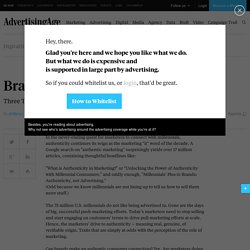

Topshop taps into real-time Twitter so customers can shop London Fashion Week trends. The fashion chain is tying up with Ocean Outdoor, social marketing platform Stackla and Twitter to identify key trends from what the fashion industry is tweeting about during the event – which kicks off this weekend – and will flag up related products on digital billboards around the country.

The six outdoor sites, powered by Ocean Outdoor, will be located in pedestrian areas of London, Leeds, Birmingham, Manchester, Liverpool and Glasgow and all within 10 minutes walking distance of a Topshop store. They will showcase live content pulled from Twitter data and a curated collection of Topshop products that fit the trend. Customers who tweet @Topshop with the a specific trend hashtag, such as #pleats or #utility, will receive a tweet with a curated collection of styles that fit the trend and can be purchased straightaway. Napoli Reference. ‘Brand Authenticity’ Definition and Measurement Scale [Study] Does ‘brand authenticity’ matter to you?
![‘Brand Authenticity’ Definition and Measurement Scale [Study]](http://cdn.pearltrees.com/s/pic/th/authenticity-measurement-142150967)
Is your brand – either the one you buy or work for – an authentic brand? And what the heck is ‘brand authenticity’ anyway? Answers are revealed in an eminently useful new 15 point scale – the Perceived Brand Authenticity Scale (PBA Scale – below) – to be published in the Journal of Consumer Psychology by an international team of researchers from the Universities of Lausanne and Bern in Switzerland, and Concordia and l’Université du Québec in Canada. So what precisely is ‘brand authenticity’? The developers of the Perceived Brand Authenticity scale reviewed research to date to cut through loose thinking and ambiguity and crystallise the idea in a clear and simple definition Definition of Perceived Brand Authenticity “The extent to which consumers perceive a brand to be faithful toward itself, true to its consumers, motivated by caring and responsibility, and able to support consumers in being true to themselves” Perceived Brand Authenticity Scale.
Beverland Reference. Is ‘V-Commerce’ the Next Big Trend for Startups? There’s e-commerce, m-commerce and even t-commerce, but the next wave of tech-driven shopping may be driven by v-commerce, according to Harry’s co-founder Andy Katz-Mayfield.

The shaving startup pushed V-commerce – or vertically integrated commerce – into the Silicon Valley spotlight this week, announcing Wednesday it raised $122.5 million to purchase the 93-year-old German razor factory Feintechnik. The company says it will now be able to create products at the speed of digital demand. Vertical integration is hardly a new concept (it was first employed by Andrew Carnegie in the late 1880’s with Carnegie Steel). But the idea of controlling all stages of production, from R&D to manufacturing to sales, is seeing a renewed interest among retailers who today are able to bypass traditional distribution channels and go straight to consumers—thanks to the Internet.
“We control everything now from manufacturing to selling directly. Continue Reading Below A New Emphasis on Transparency. Brand Authenticity: Is It for Real? In the never-ending quest for marketers to connect with millennials, authenticity continues its reign as the marketing "it" word of the decade.

A Google search on "authentic marketing" surprisingly yields over 17 million articles, containing thoughtful headlines like: "What is Authenticity in Marketing? " or "Unlocking the Power of Authenticity with Millennial Consumers," and oddly enough, "Millennials' Plea to Brands: Authenticity, not Advertising. " (Odd because we know millennials are not lining up to tell us how to sell them more stuff.)
The 75 million U.S. millennials do not like being advertised to. Can brands make an authentic consumer connection? So it's time for an industry-wide paradoxical intervention -- how do we appeal to millennials in a way that feels natural, without disingenuously and overtly claiming to be authentic? Here are three tips to get started: